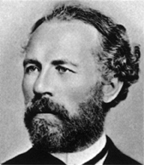Karl Scheufelen
Karl Wilhelm Scheufelen (born January 11, 1823 in Ohmden , † March 23, 1902 in Oberlenningen ) was a German entrepreneur . He was the founder of the Scheufelen paper mill .
life and work
The teacher
The son of the teacher Johann Georg Scheufelen and his wife Friederike Scheufelen born. Büchele took up the same profession as his father, he became a school teacher. In 1839 he passed the provisional examination and was employed as a school assistant in his home town of Ohmden. It can be seen from some of the original certificates and local council minutes that Scheufelen was very satisfied with the performance. As proof of this satisfaction, the local council even granted him a premium of 5 guilders and 24 kreuzers in 1844 .
In 1849, it was not only politically very lively in Kirchheim . In the course of the bourgeois March Revolution in 1848, the first democratically elected all-German parliament , the Frankfurt National Assembly , met in the Paulskirche in Frankfurt . For the constituency of Nürtingen / Kirchheim, the Nürtingen Rector Gustav Rümelin was sent as a member of the National Assembly. On December 28, 1848, the Reich Law on the Basic Rights of the German People of December 27, 1848 was promulgated in the Reich Law Gazette, which declared the basic rights to be applicable with immediate effect. This event was celebrated in Kirchheim on January 28, 1849. The law on armament passed by the National Assembly in March 1849 was implemented in Kirchheim, a youth banner was formed and armed.
In April and May 1849, the Frankfurt National Assembly dissolved in dispute. The remaining MPs “fled” to Stuttgart and met as a so-called rump parliament from June 6th until it was violently dissolved by the Württemberg military on June 18, 1849 in the capital of the Kingdom of Württemberg. In Kirchheim, believing that they had to stand up for the National Assembly, the youth banner was alerted. Since its leader was ill, Karl Scheufelen was brought in as a deputy. The youth banner marched armed in a kind of propaganda procession to Wiesensteig and then returned to Kirchheim. The next day the youth banner quietly broke up and gave away weapons and ammunition. While looking for those responsible, Karl Scheufelen was reprimanded. In a decree of the Protestant consistory of November 23, 1849, the sub-teacher was informed that he would be relieved of his duties because of his participation in "the Kirchheim riot". Although he was rehabilitated on March 7, 1850 , at the age of just 26 this was the big turning point in Karl Scheufelen's life. He no longer had any confidence in the state and should have always expected that, as the “disciplined”, career advancement would be difficult or denied for him. Therefore, he decided to resign from the civil service and give up the teaching profession. He married Johanna Christiane Beurlen in 1852.
The entrepreneur
Scheufelen was aware that he had to completely relearn when he took over the Oberlenningen paper mill, which had existed since 1773, from the property of his wife's relatives in the fall of 1855 and bought the run-down plant on March 15, 1856. At that time five to six people were employed there, development suffered from the remote location in the Lenninger Valley. The paper was handcrafted by scooping it onto molds and pressing it under a press. Scheufelen developed the paper mill operationally and initially produced cardboard and wrapping paper with a second, previously unused water power . The daily production totaled three to four quintals. It was worked like this for eleven years. But after Scheufelen saw that paper machines were being installed in other factories , he was aware that something had to change. A smaller cylinder mold paper machine and a steam engine were bought and installed. After another twelve years, the now flourishing company was able to afford a Fourdrinier paper machine. The manufacture of wrapping paper was given up and the process of manufacturing better, white paper was adopted.
The entry of his sons Adolf Scheufelen and Heinrich Scheufelen in 1888 brought a huge upswing. Adolf had studied chemistry and mechanical engineering, Heinrich previously worked as a businessman in large paper shops in Vienna and Dresden. The company produced art paper from 1889 and quickly became the market leader.
The railway pioneer
After his sons took over the management, Karl Scheufelen withdrew from the company and devoted all his energy to implementing the project for a railway line from Kirchheim to Oberlenningen. He had to struggle with incomprehension and resistance, even within his own family. The state parliament member Wilhelm Beurlen , a relative of his wife, was opposed to the project. The branch line, which is still operated today as the Teckbahn , was finally opened on September 28, 1899. The formerly disciplined teacher and now an entrepreneur, who has now been awarded the honorary title of commercial councilor , hosted the head of state King Wilhelm II of Württemberg in his house on the occasion of this event . This branch line was of great importance for the further steep upward development of the Scheufelen paper mill.
literature
- Rolf Ludwig Mehmke: Karl Scheufelen In: Swabian life pictures. ISSN 0170-0928 , Volume 1, Kohlhammer 1940, pp. 462-469.
- Hermann Missenharter: One hundred years Scheufelen in Oberlenningen. 1855-1955. Scheufelen paper mill, Oberlenningen 1955.
Individual evidence
- ↑ Werner Frotscher, Bodo Pieroth : Verfassungsgeschichte. Rn 306 and 317, 5th edition, Munich 2005, ISBN 3-406-53411-2 .
| personal data | |
|---|---|
| SURNAME | Scheufelen, Karl |
| ALTERNATIVE NAMES | Scheufelen Karl Wilhelm (full name) |
| BRIEF DESCRIPTION | German entrepreneur |
| DATE OF BIRTH | January 11, 1823 |
| PLACE OF BIRTH | Ohmden |
| DATE OF DEATH | March 23, 1902 |
| Place of death | Oberlenningen |
